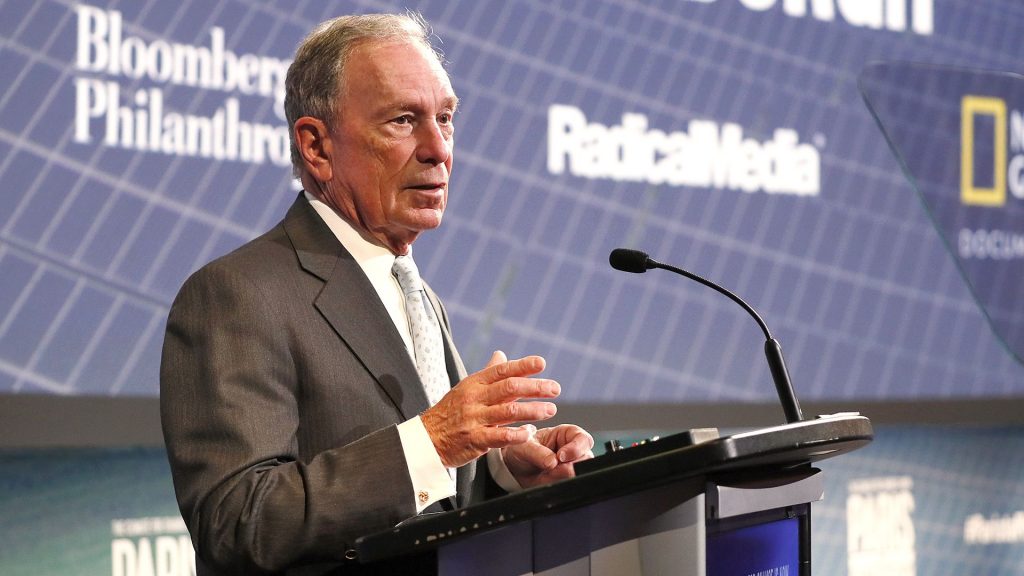If Michael Bloomberg’s appeal — the appeal of his work, ideology, or just the man himself — were to be harnessed and encapsulated in a physical form, it would look like a few stray office buildings in midtown Manhattan.
So naturally, he just filed to run for president in 2020.
Bloomberg, the billionaire businessman and former mayor of New York, is a cold and sterile figure. His tenure as mayor of New York was unimpressive at best and a brutal continuation of selective, racist martial-law and gentrification at worst. Bloomberg made his fortune selling market analytics and data to Wall Street firms in the 1980s. He was a luminary of an emerging financialized economic order that was beginning to pay less and less lip-service to concepts like “innovation” and the maximisation of an affluent society’s productive capacities. Bloomberg’s shrewdness came in his ability to sense that the point of Wall Street in an emerging age of shareholder primacy was to, in the words of economist J.W. Mason, “give capitalists their exit.” Like a reverse ambulance chaser, Bloomberg quite literally monetized the rot.
One ideal that is often espoused by pundits, financial analysts and obnoxious suburban dads is that a president should run America “like a business.” Thankfully, this (very dumb, unexamined and bad) idea is also starting to be widely mocked. Nevertheless, the concept has retained its allure among enough people to help, in part, to propel its first test subject to the White House. I guess you should decide for yourself how that’s working out for all of us.
Of course, you need the right businessman to run the world’s largest superpower, and that’s where Bloomberg comes in. Bloomberg, unlike Trump, is an actual billionaire, and really knows what it takes, or something like that. This will be Bloomberg’s campaign pitch, almost assuredly.
And outside of a few half-interested hedge-fund managers and upper-middle-class freaks who spend too much time refurbishing their LinkedIn profiles, no one is going to vote for him.
Here’s how it’s going to go: Bloomberg will raise and spend a ridiculous amount of money — upwards of $100 million, probably — and faceplant in the first few primaries, eventually causing him to drop out. That is, if pre-primary polls, which will have him lower than similarly sterile Pete Buttigeg, don’t convince him to quit while he’s only half-humiliated. It will all be for naught; vast sums of ill-gotten wealth will be, almost nihilistically, pissed away to the tangible gain of nobody. In the future, as in the past, there will be other candidates — both inside the world of government and out — who will do the exact same thing, with the exact same results. A constant, self-regenerating horror show continuing until the sun explodes.
Does this seem sane to you?
Of course, this piece isn’t about Michael Bloomberg, really — he’s never going to read this. The institutional mechanisms that secured his wealth will hold long enough. His great-great-grandchildren will be able to fund nonprofits supporting street art initiatives that boost property values in underprivileged neighborhoods whose vacant shopfronts they just bought half of. Or whatever lumpen heirs to great fortunes do with themselves. He’s going to be fine, unfortunately.
Really, I am writing this to show how deeply, deeply absurd the system of elections and obscene wealth are in this country. That some half-committed business oligarch can decide, on a whim, to throw themselves into the most consequential election in the world does not signal stable or dignified institutions.
It is even less indicative of a sensical system to have widely-detested machine politicians do the same. That Jeb Bush or Beto O’Rourke can raise vast sums of cash from influence-peddling morons with extremely bad political instincts is probably more embarrassing.
I mean, fucking come on. Have you ever really sat and looked at reports that detail how much money is spent by the rich each election cycle on candidate promotion? It is almost unfathomable. What can this money possibly be doing more efficiently than, say, increased social services or purchasing power among everyone else couldn’t be? Are we really about to keep this current system going so Bloomberg can commission some marketing firm to put his ugly campaign logo everywhere? Are we really going to let our civic processes be hijacked so we can watch Ted Cruz, who looks like a melting wax figure, approximate human affability and speech in a promotional video with Ted Nugent? Do we really want to codify a system completely ambivalent to the interests of most people so monopolistic firms can fight against potential municipal taxes? Really?
Of course, this system is contingent on a panoply of bad judicial rulings and legislative choices — not bound by the foundations of the universe. So that’s a silver lining. There are alternatives.
 For example, there have long been calls to push for public funding of elections, including a few bills in congress. Really, a more sober system of campaign funding would probably be one in which the federal government sets aside a specific “campaign finance budget” that is activated at a set date, dispersing equal funds out to any candidate who files the proper paperwork.
For example, there have long been calls to push for public funding of elections, including a few bills in congress. Really, a more sober system of campaign funding would probably be one in which the federal government sets aside a specific “campaign finance budget” that is activated at a set date, dispersing equal funds out to any candidate who files the proper paperwork.
After all, that’s equality of opportunity, right? Isn’t that what everyone claims to be going for?
Such campaign finance reform, however, would run into problems in our virulently reactionary Supreme Court. The court decided in 2010’s Citizens United v. FEC (codifying precedents they had set in 1976’s Buckley v. Valeo) that money, especially campaign money, is a form of political speech, and restrictions on campaign spending are tantamount to censorship. Any such law seeking to overhaul our current system would thus have to confront the logic of this decision head on.
Of course, the logic behind the decision, like most stemming from right wing “originalist” legal theory, is moronic. Money as such is obviously not equal to speech. A “free marketplace of ideas” is not aided by having no caps on spending, but rather distorted and tainted by unequal positions in disposable wealth; this has been shown time and time again in social sciences research, because, well, it’s fucking obvious.
This seemingly obvious line of argument is of little use now that the precedent is set, unfortunately. Money is considered speech in courts of law, so now anyone seeking campaign finance reform would have to deal with the precedent on its own terms. That’s the law — in all its majestic equality — for you.
Taking the “money is speech” assertion at face value to argue for campaign-spending reform isn’t as hard as it seems, however; the “money is speech” axiom leaves itself especially vulnerable to leftist critique by assuming an entire universe of vague egalitarian assumptions about the nature of economic and social power. Put shortly: Assuming “money is political speech” is in turn assuming that everyone has equal financial and social resources necessary to participate in such political speech in the first place. This assumption is wrong, obviously, and that’s exactly the point: You cannot claim that political spending (which is grossly unequal across class and gender lines) is the same as speech (which everyone nominally has the ability to express) without putting the entire American system of property ownership and contract rights on trial as well.
This line of argument is strongly taken from the progressive “Legal Realist” tradition — which I have tried to make interesting to you, the reader, here — and has traditionally been a powerful analytical tool in debunking incoherent libertarian theories of liberty and its relation to the law.
Such Legal Realist justifications for campaign finance reform have a strong tradition. Twenty years before the Citizens United ruling, Duke law professor J.M. Balkin concluded a section of his paper “Some Realism about Formalism: Legal Realist Approaches to the First Amendment” by punctuating the arguments made above aptly:
“My conclusion, then, is that campaign finance reforms may be constitutional not because money is not speech, but because in a very important sense it is. The government is responsible for inequalities in access to the means of communication because it has created the system of property rights that makes such inequalities possible. Therefore, it is not only wrong but also incoherent for opponents of campaign finance reform to contend that the government should not regulate access to the political process. Government already regulates access to the political process – the first amendment simply demands that it do so fairly. At the very least the first amendment should not act as a barrier to attempts to ensure that the process works equitably.”
It is thus difficult, but not impossible to argue for some semblance of sanity among campaign spending to our backwards, reactionary institutions. Sound counterarguments can always be made, and harmful precedents always undone. The real task, then, is to force the handpicked goons of capital who currently make up the Supreme Court to face their shitty arguments on its own terms.
It is still highly doubtful that the Gorsuchs and Kavanaughs of the court — who our constitution has ordained with the right of lifetime appointmenships, all but guaranteeing their power for a generation — will be convinced by a superior line of argument. Despite fawning odes to the un-taintibility of law you occasionally see, there really is no universal Right or Wrong way to determine law; subjectivity is inevitable, and biases cannot be avoided. The law, as Legal Realist forebear Karll Lllewyn believed, is “little more than putty in the hands of a judge who could shape the outcome of a case based on personal bias.” Such is life under our farcical liberal institutions.
Knowing how arbitrary judicial deliberation is makes it hard to not just scrap this entire analysis and call for something more radical, like court packing or even just getting rid of our current system all together, where one person simply wouldn’t have the disposable wealth to throw away on a political donation or campaign. One of the challenges of writing institutional critique as someone whose beliefs are left-of-liberal is resisting the urge to destroy everything and start anew. This is certainly more desirable to me personally —
I don’t see much worth saving in a political-economic order like this one: a legal order that still parades the lie of equality before the law while propagating disparities in power relations; an economic order that seeks to uphold the deservedness of mass wealth and privilege while ignoring the institutional mechanisms — like contract and property law — that make such gains available in the first place; a rhetorical culture that makes people believe that inequality is the default state of things, that there is no difference between wealth and virtue, between poverty and moral failings — that suffering is something you must accrue yourself out of through the market. What’s the point of any incrementalist reform?
But, just as refurbishing the dining room on the Titanic is a recipe for failure, so is skimping on the lifeboat budget. Reforms — be they in campaign finance, labor law or mass incarceration — are necessary simply by the potentialities they can unleash in the imaginations of those who benefit.
Cynicism is understandable in a situation like ours, but fatalism is not. There is a stark difference between contingency and inevitability, any issue regarding the social and legal construction that is government certainly falls on the former.
At its best, a system of public-election financing — and the more sober ideological playing field it could create — could spur a long line of reforms that ignite people with a newfound sense of power and agency that the structures in which they live are not preordained, and wrestling them back from the wealthy is within their right.
At worst, it can make it harder for people like Michael Bloomberg to run for president.




Comments are closed.